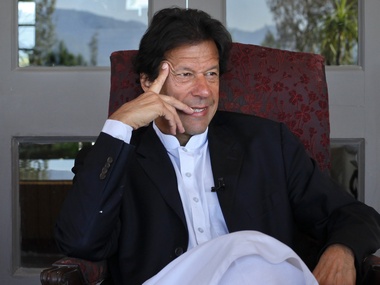By Vidya S Sharma The political fortune of Pakistani cricketing superstar-turned-politician Imran Khan is on the rise. Since he founded his Tehreek-e-Insaf party, or Movement for Justice (MJP), in 1996, Khan has remained a fringe player. But his political rallies, both in Lahore and Karachi, recently attracted huge crowds. If these rallies translate into votes at the next election, his party should take seats mainly from President Zardari’s Pakistan Peoples Party (PPP) and Nawaz Sharif’s Pakistan Muslim League (N) (PML-N). Khan’s MJP may not gain an absolute majority, but it would certainly emerge as one of three big players. Khan’s party, until now, was a one-man band. But with Pakistan’s latest round of political upheavals, all this seems to be changing. The retired Air Marshal Asghar Khan, another fringe player, recently merged his Tehreek-e-Istiqlal party with Khan’s MJP. Several other politicians from the PPP and PML-N have joined Khan’s party, including former foreign minister, Shah Mahmood Qureshi. And there are even reports that a number of sitting parliamentarians from the PPP, PML-N and former President Musharraf’s party, PML-Q, are pleading with Khan to accept them into his party. [caption id=“attachment_190883” align=“alignleft” width=“380” caption=“Khan is viewed as one of the most virulently anti-American and anti-Western politicians in Pakistan today. Reuters”]  [/caption] Given these political machinations, it is now highly pertinent to ask what kind of a prime minister Imran Khan would turn out to be. Khan, before going to Oxford (where he studied philosophy, politics and economics), was educated in Christian schools in Pakistan and the Royal Grammar School in England. He married English socialite and heiress Jemima Goldsmith, first in an Islamic ceremony and then in a civil ceremony in England: they are now divorced and their two sons live with Jemima in England. Does this background mean he would be sympathetic to the Western worldview? It seems unlikely. Khan is viewed as one of the most virulently anti-American and anti-Western politicians in Pakistan today. In fact, until late last year, the biggest rallies at which Khan was used to speaking were those organised by Qazi Hussain Ahmad, a prominent sympathiser of the Taliban and Haqqani networks, and former President of Pakistan’s Islamist party, Jamaat-e-Islami. Khan inherited this anti-Western attitude from his political mentor, Gen Hamid Gul, a former head of the Inter-Services Intelligence (ISI), Pakistan’s notorious and all-pervasive intelligence agency. Gul was responsible for recruiting, training, and providing funds and safehouses to the Mujahideen during the Soviet occupation of Afghanistan and later was a central player in the emergence of the Taliban. He still maintains very strong links with the Taliban. He also reportedly maintains strong links to terrorist outfits such as al-Qaeda, Lashkar-e-Taiba, Lashkar-e-Jhangvi and the Haqqani network. And although Gen Gul left the ISI some time ago, he — and his anti-Western ideology — still continues to dominate the worldview of the ISI and most of the Pakistani army. After being a fringe player for more than 15 years, these allegiances now seem to be bearing fruit for Khan, helping him attract the huge crowds witnessed in Lahore and Karachi. Also indicative of his allegiances is the fact that Khan never criticised the military rule of President Zia-ul-Haq — a close ally of Gen Gul — and President Musharraf was disposed to appointing Khan to his cabinet although the latter declined the invitation. Sources close to Musharraf have even said that at one stage the former president considered making Khan the prime minister. Now, all available evidence suggests the Pakistani military has adopted Imran Khan as its preferred candidate. Khan has often talked about improving the lot of ordinary citizens and creating jobs for the young (his biggest support base), while remaining silent on the need to slash the military’s budget by at least by 50 percent in order to achieve this goal. Khan has also excoriated the US and its partners’ fight against the Taliban, but is mute on the Taliban’s atrocities. Similarly, there was little reaction after the killing of Saleem Shahzad , a journalist who was about to expose the extent of al-Qaeda’s infiltration of the Pakistani navy. And while Khan strongly criticised the US for its operation against Osama bin Laden, he failed to question how the world’s most wanted terrorist had been living in Abbottabad, a garrison town run by the Pakistani army. The Pakistani defence establishment also likes Imran Khan because he is untainted by corruption, something that feeds off the present mood of the nation. In any case, the military has never liked the Bhutto family nor their party, the PPP. Khan also has strong ties to the ISI, is hostile toward the interests of both the US and NATO, supports the Pakistani military’s strategy in Afghanistan and is politically inexperienced. Perhaps they see him as a puppet who can be easily manipulated. Either way, Khan’s potential electoral success looks set to contribute even further to Pakistan’s increasing political instability and continuing dominance of the Pakistani military. Vidya S Sharma is based in Melbourne and advises on country risk management, inter-country joint ventures and market penetration strategies. Republished with permission from East Asia Forum.
The assumption that he represents liberal values is flawed. He merely represents a softer face of the Pakistan military-ISI complex. His ascent is bad news for Pakistan’s political stability.
Advertisement
End of Article
Written by FP Archives
see more


)

)
)
)
)
)
)
)
)



